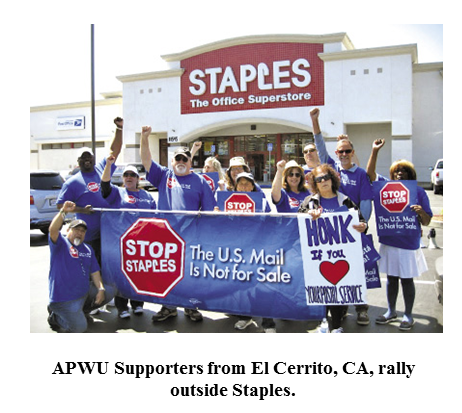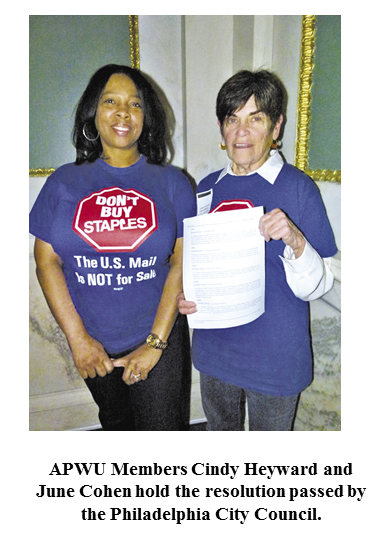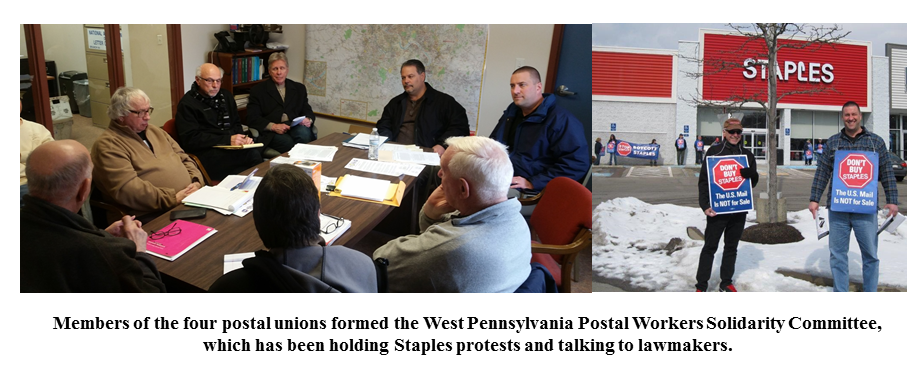March 1, 2015
‘Stop Staples’ Campaign Disrupts Privatization Push
 (This article first appeared in the March-April 2015 issue of The American Postal Worker magazine.)
(This article first appeared in the March-April 2015 issue of The American Postal Worker magazine.)
Since the Postal Service launched its no-bid deal with Staples, thousands of postal workers and supporters have made headlines boycotting and protesting the office-supply chain – and their efforts have paid off.
In a farewell address to reporters at the National Press Club on Jan. 6, former Postmaster General Patrick Donahoe admitted that the union’s Stop Staples campaign had “disrupted” the USPS-Staples deal.
Perhaps more importantly, Donahoe acknowledged that the union’s campaign has made it more difficult for the USPS to get other businesses to participate in management’s scheme to privatize postal retail operations.
“Just last year, the American Postal Workers Union mounted a protest campaign and disrupted our partnership with Staples,” Donahoe said. “Unfortunately, it’s now tougher for us to find retail partners.”
 APWU President Mark Dimondstein counts that as a major win. “Management’s difficulty finding companies that are willing to privatize postal functions is an important victory in itself,” he said. “And it is a direct result of our members’ efforts.”
APWU President Mark Dimondstein counts that as a major win. “Management’s difficulty finding companies that are willing to privatize postal functions is an important victory in itself,” he said. “And it is a direct result of our members’ efforts.”
Why We’re Boycotting
In the fall of 2013, the Postal Service and Staples implemented a pilot program that established knock-off post offices in 82 Staples stores. As expected, a modified version of the program is being expanded to Staples stores across the country.
The postal counters are staffed with low-wage Staples employees rather than highly-trained USPS employees.
 Secret USPS documents revealed that the Staples deal was intended to privatize window clerk duties and reduce labor costs. The APWU objects to the Staples deal because it privatizes the retail operations of the public Postal Service; transfers living-wage, union jobs to low-wage jobs, and compromises the safety and security of the mail.
Secret USPS documents revealed that the Staples deal was intended to privatize window clerk duties and reduce labor costs. The APWU objects to the Staples deal because it privatizes the retail operations of the public Postal Service; transfers living-wage, union jobs to low-wage jobs, and compromises the safety and security of the mail.
Expanding its Empire,
Stiffing Workers
There’s been quite a bit of other Staples news in recent weeks.
In early February, Staples announced plans to acquire Office Depot for $6.3 million, in a monopolistic merger that the APWU vigorously opposes. The union has urged the Department of Justice and Federal Trade Commission to block the deal.
 “A Staples takeover of Office Depot would lead to higher prices for consumers and store closings that would affect employees and customers alike,” Dimondstein said.
“A Staples takeover of Office Depot would lead to higher prices for consumers and store closings that would affect employees and customers alike,” Dimondstein said.
About a week after the merger announcement, major news outlets reported that Staples management had threatened to discipline employees who worked more than 25 hours per week, in an effort to sidestep its obligation to fund employees’ health insurance under the Affordable Care Act. In addition to transferring living-wage jobs to the low-wage sector and undermining the sanctity of the mail, the Postal Service’s deal with Staples “props up the profit margins of an anti-worker company,” Dimondstein said.
Don’t Be Fooled by Quill
Recently, several APWU locals were unpleasantly surprised when packages they ordered from Quill.com were delivered by workers wearing Staples’ uniforms.
Unbeknownst to many, the Quill Corporation has been a subsidiary of Staples since 1998, accounting for 25 percent of its sales.
“So add Quill to your boycott list,” Dimondstein declared.
 Return to Sender
Return to Sender
In December, the Postal Service sent a mass mailing to “postal customers” in numerous cities, including Philadelphia and New York, advertising 20 percent discounts on USPS shipping services at Staples stores.
Calling it a “slap in the face to postal workers,” one local president got busy.
Vince Tarducci, president of the Philadelphia BMC Local, distributed a flyer urging members to “Mark your Staples mail, ‘Return to sender,’ and send it back where it came from.”
The City of Brotherly Love took the Staples boycott a step further on Dec. 11, 2014, when its City Council voted unanimously to adopt a resolution to support the APWU’s efforts “to protect living-wage jobs and its insistence on the highest possible standards of customer services.” The resolution opposed efforts to privatize postal operations and called on Philadelphians to consider this issue when deciding whether to patronize Staples.




